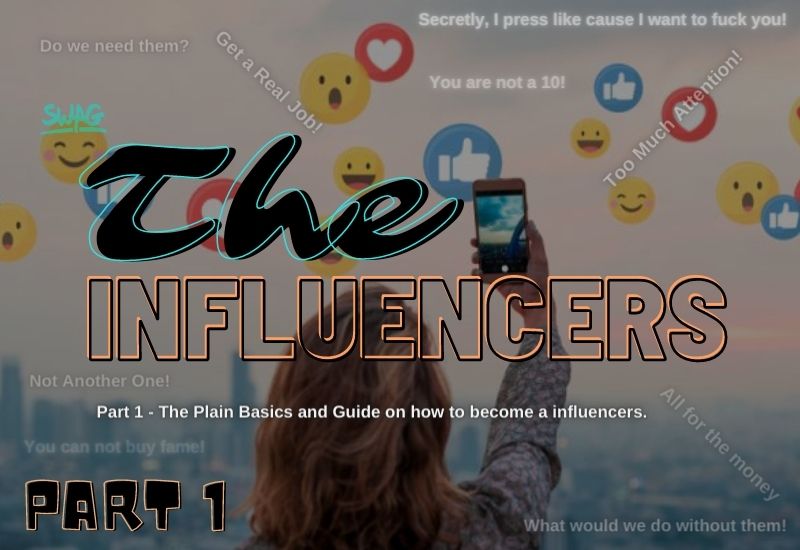Hey there, folks! The creative scene is evolving at warp speed, thanks to technology. And let me tell you, Asian influencers are making some serious waves in the game. From fashionistas to photography whizzes, these trendsetters are leaving their mark and capturing hearts.
These Asian influencers are not your average crowd-blenders. They’re breaking barriers and creating mind-blowing content that catches everyone’s eye. Their passion for their craft is infectious, and their artistic prowess is out of this world. They stand out from the pack, inspiring others to chase their dreams. Now, let’s talk numbers. These Asian influencers are ruling social media platforms like bosses. But here’s the thing, what exactly does it mean to be an “influencer” in today’s world?
What is an influencer?
Alright, listen up, folks! An influencer is no ordinary Joe or Jane on social media. They’re the big shots who’ve carved out a name for themselves and hold serious sway over their followers. These guys and gals have the power to shape opinions, behaviors, and even what you whip out your wallet for. Now, influencers ain’t just generic peeps. They specialize in specific fields like beauty, fashion, fitness, or travel. They dish out top-notch content that hooks you in and keeps you coming back for more. What sets them apart? It’s all about being real, relatable, and connecting with their followers on a whole new level. They ain’t your typical celebs, that’s for sure! These influencers team up with brands, promote products, and build a sense of community by chatting it up with their followers. They’re the movers and shakers in this digital age, setting trends and driving consumer choices. And let me tell you, from Indonesia to China, we’ve got a lineup of 10 Asian influencers who are making the creative scene explode! Hold on tight, ’cause it’s gonna be a wild ride!

Here are the 10 Asian influencers:
- Bretman Rock: Known for his vibrant personality and makeup tutorials, Bretman Rock is a Filipino-American influencer who has gained millions of followers on Instagram and YouTube.
- Michelle Phan: Michelle Phan is a Vietnamese-American beauty influencer who rose to fame with her makeup tutorials on YouTube. She has since launched her own beauty brand, Em Cosmetics.
- Gigi Gorgeous: Gigi Gorgeous, a Canadian model, actress, and LGBTQ+ activist gained popularity through her YouTube channel where she shares beauty and fashion content, as well as personal stories of her transition.
- Huda Kattan: Huda Kattan, of Iraqi heritage, is a prominent beauty influencer and the founder of Huda Beauty. Her makeup tutorials and product recommendations have garnered a massive following worldwide.
- Lilly Singh: Lilly Singh, also known as Superwoman, is a Canadian-Indian YouTuber, comedian, and actress. She uses her platform to discuss social issues, share comedic sketches, and promote positivity.
- Ryan Higa: Ryan Higa, also known as nigahiga, is a Japanese-American comedian, YouTuber, and actor. He gained popularity for his humorous sketches and parodies on his YouTube channel.
- Jackie Aina: Jackie Aina is a Nigerian-American beauty influencer who advocates for diversity and inclusivity in the beauty industry. Her makeup tutorials and product reviews have made her a respected voice in the community.
- Nash Grier: Nash Grier is an American social media personality of mixed Asian descent. He gained popularity on Vine with his comedic videos and has since expanded his presence on platforms like Instagram and YouTube.
- Jamie Chua: Jamie Chua is a Singaporean influencer known for her luxurious lifestyle and fashion content. She shares her beauty routines, travel experiences, and fashion hauls with her followers.
- Chiara Ferragni: Chiara Ferragni is an Italian influencer and entrepreneur of Chinese descent. She gained prominence through her fashion blog, The Blonde Salad, and has since collaborated with numerous luxury brands.
These are just a few examples of Asian influencers who have made a mark in the digital sphere. There are many more talented and influential individuals from diverse Asian backgrounds who continue to shape the influencer landscape.
Significant impact on young Asian youth
Asian influencers have become powerful role models for young Asian youth, influencing them in various impactful ways. Firstly, representation matters. Seeing individuals who look like them and share their cultural background thrive in diverse fields instills a sense of pride and possibility. These influencers break stereotypes and inspire young Asians to embrace their unique identities and pursue their passions fearlessly. Secondly, they offer relatable content, addressing topics that resonate with Asian youth, such as cultural experiences, language, identity, and mental health. By openly discussing these issues, they create safe spaces for dialogue, foster empathy, and help combat isolation. Lastly, Asian influencers promote inclusivity and diversity, celebrating different perspectives and fostering acceptance. Their influence encourages young Asians to embrace their heritage, embrace diversity, and work towards a more inclusive future. Asian influencers have a significant impact on young Asian youth in several ways:
- Representation and Identity: Seeing Asian influencers thriving in various fields, such as beauty, fashion, comedy, and activism, provides young Asian individuals with role models to who they can relate. This representation helps foster a sense of pride in their own cultural heritage and encourages them to embrace their unique identities.
- Breaking Stereotypes: Asian influencers challenge stereotypes and break down barriers by showcasing their talents and achievements. They prove that Asians can excel in any field and shatter preconceived notions about what it means to be Asian.
- Cultural Pride and Connection: Many Asian influencers celebrate their cultural heritage and share aspects of their traditions, language, and customs. This helps young Asian youth connect with their roots, learn about their own cultures, and develop a sense of cultural pride.
- Empowerment and Confidence: Asian influencers often promote messages of self-love, acceptance, and empowerment. Their stories of overcoming challenges and pursuing their passions inspire young Asian individuals to believe in themselves and follow their dreams.
- Social Issues and Activism: Asian influencers frequently use their platforms to raise awareness about social issues affecting their communities, such as racism, discrimination, mental health, and LGBTQ+ rights. They encourage young Asian youth to engage in important conversations, challenge injustice, and advocate for positive change.
- Career Aspirations: Asian influencers who have achieved success in various industries inspire young Asian individuals to pursue their own aspirations. They provide examples of diverse career paths and demonstrate that with hard work, dedication, and talent, they too can succeed in their chosen fields.
Overall, Asian influencers play a vital role in empowering and motivating young Asian youth. They offer representation, break stereotypes, foster cultural pride, and inspire the next generation to embrace their identities, pursue their passions, and make a positive impact in the world.
Asian influencers monetize their fame cause they need to!

Asian influencers monetize their fame through various channels and business models. Here are a few examples of how they generate income:
- Brand Collaborations and Sponsorships: Influencers often collaborate with brands to promote their products or services. They may create sponsored content, including social media posts, videos, or blog features, in exchange for payment or free products. Brands value the influencers’ large followings and their ability to reach target audiences effectively.
Example: Huda Kattan of Huda Beauty collaborates with cosmetic brands and promotes their products through her social media platforms, often including makeup tutorials and reviews.
- Affiliate Marketing: Influencers can earn a commission by promoting products or services through affiliate links. When their followers make a purchase using these links, the influencers receive a percentage of the sales.
Example: Many fashion influencers use affiliate marketing platforms like RewardStyle or ShopStyle Collective to earn commissions on clothing, accessories, or beauty products they recommend.
- Ad Revenue: Influencers with significant followings on platforms like YouTube or TikTok can generate income through advertising. They receive a portion of the revenue from ads displayed on their content, based on factors like views, engagement, and ad clicks.
Example: Ryan Higa (nigahiga) monetizes his YouTube channel through ad revenue generated by the ads shown on his videos.
- Merchandise and Product Lines: Influencers often create their own merchandise, such as clothing, accessories, or beauty products, to sell to their followers. They leverage their brand and audience loyalty to drive sales.
Example: Michelle Phan launched her own beauty brand, Em Cosmetics, which offers a range of makeup products to her dedicated fan base.
- Content Creation Services: Influencers may offer their expertise in content creation, such as photography, videography, or social media management, as services to brands or individuals. They leverage their skills and experience to provide value and earn income.
Example: Asian influencers who have developed strong aesthetic and photography skills may offer their services as content creators or brand consultants. It’s important to note that each influencer’s business model may vary based on their niche, audience, and personal brand. Some influencers may combine multiple income streams to diversify their revenue sources and maximize their earnings.
Have a go at these 10 names.
The well best known influential Asian personalities along with additional information and links to learn more about them:
- Kylie Jenner: Notably of Korean descent, Kylie Jenner is a businesswoman, reality TV star, and founder of Kylie Cosmetics. Her entrepreneurial success has contributed to her immense wealth. Learn more about her on her official website: Kylie Jenner Official Website
- Huda Kattan: Huda Kattan, of Iraqi heritage, is the founder of Huda Beauty, a global cosmetics brand. She gained recognition for her makeup skills and now runs a successful beauty empire. Explore Huda Beauty and her journey on her official website: Huda Beauty Official Website
- Zhang Dayi: Zhang Dayi is a Chinese fashion influencer and entrepreneur who rose to fame through her online clothing store. She has become one of China’s wealthiest internet celebrities. Discover more about her fashion endeavors on her Weibo account: Zhang Dayi on Weibo
- Michelle Phan: Michelle Phan, of Vietnamese heritage, is a prominent beauty influencer and entrepreneur. She gained popularity through her YouTube makeup tutorials and later launched her own beauty brand, Em Cosmetics. Learn more about her journey on her official website: Michelle Phan Official Website
- Lin Chi-ling: Lin Chi-ling is a Taiwanese model, actress, and influencer. She has garnered endorsements from various luxury brands and has expanded her business ventures into fashion and skincare. Get more information about her on her Instagram profile: Lin Chi-ling on Instagram
- Ryan Higa: Ryan Higa, of Japanese heritage, is a popular YouTuber and comedian known for his humorous content. His YouTube channel, nigahiga, has garnered millions of subscribers. Explore his comedic sketches and vlogs on his YouTube channel: nigahiga on YouTube
- Jamie Chua: Jamie Chua is a Singaporean influencer and socialite known for her luxurious lifestyle. She has built a significant following on social media and showcases her extravagant experiences. Follow her glamorous life on her Instagram account: Jamie Chua on Instagram
- G-Dragon: Kwon Ji-Yong, known as G-Dragon, is a South Korean rapper, singer-songwriter, and fashion influencer. He has made a mark in the music industry and has collaborated with renowned brands. Discover more about his music and fashion on his Instagram account: G-Dragon on Instagram
- Nash Grier: Nash Grier, of mixed Asian descent, gained fame on Vine and has transitioned to YouTube and other social media platforms. He has ventured into various business opportunities, including brand partnerships and merchandise sales. Explore his content and ventures on his YouTube channel: Nash Grier on YouTube
- Jenn Im: Jenn Im, of Korean heritage, is a fashion and beauty influencer known for her YouTube channel, ClothesEncounters. She collaborates with brands and has launched her own clothing line. Follow her fashion journey on her YouTube channel: ClothesEncounters on YouTube
Please note that the provided links are subject to change and the availability of content is at the discretion of the respective influencers.

Everyone wants fame…or not.
Young Asian individuals have innovatively devised numerous methods for online selling. Our thorough investigation has led us to compile this impactful and informative list, showcasing their expertise. These individuals possess a deep understanding of influencer strategies and adeptly adapt them to their own ventures. Working on a local scale, they form collaborative groups, continuously experimenting with fresh ideas and approaches. The young generation is poised to achieve fame at an accelerated pace, surpassing their role models. Notably, influencers serve as both role models and mentors, imparting invaluable knowledge to young Asians on the art of online selling. Through their guidance, the path to online success is paved for aspiring entrepreneurs.
- E-commerce Platforms: Young Asians often leverage popular e-commerce platforms such as Amazon, eBay, Taobao, Tmall, Lazada, Shopee, or Flipkart to sell products. These platforms provide a ready-made marketplace with a large customer base, secure payment systems, and logistics support.
- Social Media Selling: Social media platforms like Instagram, Facebook, WeChat, and TikTok serve as effective channels for young Asians to showcase and sell products directly to their followers. They create engaging content, utilize influencers, and provide convenient purchasing options through integrated shopping features or by directing customers to external websites.
- Personal Websites or Online Stores: Young Asians may establish their own websites or online stores using platforms like Shopify, Wix, or WooCommerce. This approach gives them full control over branding, product display, and customer experience. They can also integrate secure payment gateways for seamless transactions.
- Online Marketplaces: Apart from general e-commerce platforms, there are specific online marketplaces tailored to Asian markets. For example, young Asians can sell on platforms like Rakuten Ichiba (Japan), Gmarket (South Korea), or Tiki.vn (Vietnam), which caters to local consumers and offers a wide range of products.
- Peer-to-Peer Marketplaces: Young Asians may utilize peer-to-peer marketplaces such as Carousell, Mercari, or Depop, where individuals can sell used or new items directly to others. These platforms often have a strong presence in specific regions and provide a platform for young sellers to reach local buyers easily.
- Group Buying and Flash Sales: Some young Asians participate in group buying or flash sale platforms like Pinduoduo (China) or Woop! (South Korea). These platforms offer discounted prices for products when a certain number of customers join the purchase, creating a sense of urgency and encouraging viral sharing.
- Online Auctions: Online auction platforms like Yahoo Auctions (Japan) or eBay Auctions enable young Asians to sell products through bidding systems. This can be beneficial for unique or rare items that may fetch higher prices through competitive bidding.
Alright, folks, let’s break it down. When it comes to selling stuff, the game changes depending on who you’re selling to, what you’re selling, and where you’re selling it. And hey, young Asians know how to play this game like pros. They mix and match different strategies, hitting up all the platforms and channels to score big bucks. Now, here’s the deal. You can go global or keep it local, as long as it’s bringing in the moolah. Young Asians are getting creative and finding ways to reach their audience far and wide. They’re hustling and making it work, no matter what it takes. So, remember, whether it’s a big-time move or a neighborhood gig, as long as it sells, these young Asians are making moves and getting that paper.
You have to work hard for fame
The ability to sell online and have a life outside of work can have varying emotional impacts on the newer generation of Asians. While driven and motivated, this group often faces unique challenges and experiences that can affect their lives in different ways.
- Drive and Ambition: Young Asians who are skilled in online selling are often highly driven individuals. They possess a strong work ethic and are determined to succeed in their endeavors. Their ambition fuels them to constantly improve, adapt to market trends, and seek new opportunities.
- Work-Life Balance: Balancing work and personal life can be a challenge for young Asians engaged in online selling. The drive to succeed may lead to long working hours and dedication to their businesses, sometimes at the expense of personal relationships and leisure activities. Striving for a healthy work-life balance becomes crucial to maintain emotional well-being.
- Impact on Relationships: The commitment to their online ventures can strain relationships with family and friends. Spending extensive hours on business activities and the pressure to succeed may lead to limited time and availability for social interactions. It becomes essential to find ways to nurture relationships and communicate the importance of their pursuits to loved ones.
- Geographical Flexibility: Online selling provides the advantage of location independence. Young Asians engaged in this field can often choose where they live and work. This flexibility allows them to explore new opportunities, move to areas with better business prospects, or cater to specific target markets. However, it may also lead to a sense of detachment from their cultural or geographical roots.
- Financial Independence: The financial success that can come from online selling empowers young Asians with a sense of financial independence. This freedom can positively impact their lives by enabling them to support themselves, and their families, and pursue personal goals. It can also alleviate financial stress and provide a platform for personal growth and fulfillment.
- Peer and Community Influence: Within the online selling community, young Asians can find support, guidance, and inspiration from like-minded individuals. Sharing experiences, and knowledge, and collaborating with peers can enhance their emotional well-being and motivate them to strive for success. Building connections with fellow entrepreneurs helps create a strong sense of community.
Overall, while the ability to sell online empowers young Asians, it is crucial for them to maintain a balance between work and personal life. It’s important to be aware of the emotional impact and actively seek ways to address challenges, nurture relationships, and find fulfillment beyond their entrepreneurial pursuits.

Influencers are modern salespeople.
Influencers have emerged as a new generation of online sellers, wolves in sheep’s clothing, reshaping the landscape of digital commerce. Their rise to prominence can be attributed to several factors that have contributed to their success in the online selling space. Let’s examine the factual aspects of how influencers have become significant players in this realm.
- Reach and Influence: Influencers possess substantial online followings across various social media platforms. Their ability to connect with and engage a large audience gives them a significant advantage in promoting products or services. Brands recognize the potential reach of influencers, and leveraging their influence allows for effective product promotion and exposure to a targeted consumer base.
- Authenticity and Trust: One crucial aspect that sets influencers apart is their perceived authenticity. Their followers often view them as relatable figures who offer genuine recommendations and insights. This trust establishes a strong connection between influencers and their audience, making their product endorsements more impactful and influential.
- Niche Expertise: Influencers typically focus on specific niches or industries, allowing them to develop deep expertise and knowledge within those domains. Whether it’s beauty, fitness, fashion, or technology, influencers establish themselves as authorities in their respective fields. Their expertise lends credibility to their recommendations and influences the purchasing decisions of their followers.
- Creative Content Creation: Influencers excel in creating compelling and engaging content. They employ various forms of media, including high-quality images, videos, tutorials, and reviews, to showcase products or services. Their creativity and storytelling abilities capture the attention of their audience, making their promotional content more memorable and persuasive.
- Collaborations with Brands: Influencers often collaborate with brands through sponsored content, partnerships, or brand ambassadorships. Such collaborations allow influencers to monetize their online presence while giving brands access to their engaged audience. These collaborations provide influencers with financial opportunities and further enhance their credibility as influential sellers.
- The shift in Consumer Behavior: The rise of influencer marketing can be attributed to a shift in consumer behavior. Traditional advertising methods are becoming less effective as consumers increasingly rely on recommendations from people they trust. Influencers bridge this gap by serving as trusted intermediaries between brands and consumers, offering genuine and personalized recommendations.
- Data-driven Metrics: Influencer marketing has evolved to become data-driven. Brands now analyze engagement metrics, reach, and conversion rates to assess the effectiveness of influencer campaigns. This data-driven approach enables brands to evaluate the return on investment and make informed decisions when collaborating with influencers.
It is important to recognize that while influencers play a significant role in online selling, they are not without their challenges. Influencer marketing regulations, issues of authenticity, and the saturation of the influencer market are some factors that pose ongoing considerations for both influencers and brands. Nonetheless, their impact on the online selling landscape cannot be overlooked, as they continue to shape consumer behavior, brand strategies, and the future of digital commerce.
Do you have what it takes?
Becoming an influencer takes dedication, strategy, and hard work. Find your passion, create killer content, build your following, collaborate, and stay consistent. It’s a journey, not an overnight success.
- Define Your Niche: Determine the area of expertise or interest you want to focus on as an influencer. Choose a niche that aligns with your passion and where you can provide unique value to your audience.
- Research Your Target Audience: Understand your target audience’s demographics, interests, and preferences. Conduct market research and analyze existing influencers in your niche to identify gaps and opportunities.
- Create Compelling Content: Develop a content strategy that resonates with your target audience. Create high-quality and engaging content across platforms like YouTube, Instagram, or a blog. Experiment with different formats, such as videos, images, or written articles, to find your unique voice.
- Be Consistent and Regular: Consistency is key in building your online presence. Set a consistent posting schedule and stick to it. Regularly interact with your audience and respond to comments and messages to foster engagement.
- Collaborate with Others: Collaborate with other influencers or brands in your niche. Collaborations can help expand your reach, expose you to new audiences, and enhance your credibility. Seek mutually beneficial partnerships that align with your values and goals.
- Engage with Your Audience: Actively engage with your audience by responding to comments, messages, and feedback. Foster a sense of community by asking questions, running contests or giveaways, and hosting live sessions. Build genuine connections with your followers.
- Utilize Social Media Tools: Familiarize yourself with social media management tools like Hootsuite, Buffer, or Sprout Social to schedule posts, monitor analytics, and optimize your social media presence. Use data-driven insights to refine your strategy and improve performance.
- Collaborate with Brands: As your influence grows, start reaching out to brands that align with your niche. Craft compelling brand collaboration proposals showcasing the value you can provide. Alternatively, brands may approach you for partnerships once your following and engagement metrics are impressive.
- Stay Authentic and Transparent: Authenticity is vital to maintaining your audience’s trust. Be transparent about sponsored content and disclose any partnerships or affiliations. Remain true to your values and avoid promoting products or services that don’t align with your brand or audience’s interests.
- Continuously Learn and Evolve: Stay updated on industry trends, platform algorithms, and emerging technologies. Attend industry events, follow thought leaders, and invest in personal growth. Be open to feedback and continuously improve your content, skills, and strategy.
Remember, building a successful influencer career takes time and effort. Stay patient, stay true to yourself, and consistently deliver value to your audience.
But they are not immune to making mistakes
While influencers can achieve great success, they are not immune to making mistakes that can have a significant impact on their careers. Here is a list of ten notable influencer fails that led to detrimental consequences:
- Misleading or Dishonest Content: Sharing misleading information, promoting fraudulent products, or being dishonest about sponsored content can damage an influencer’s credibility and trust with their audience.
- Cultural Insensitivity: Insensitive remarks or actions that offend or disrespect different cultures can lead to severe backlash. Insensitivity towards cultural diversity can result in lost followers and damaged brand partnerships.
- Offensive or Controversial Statements: Making offensive remarks, engaging in hate speech, or promoting discriminatory ideologies can have severe repercussions. Such actions can lead to public outrage, loss of followers, and brand collaborations being terminated.
- Lack of Disclosure: Failure to disclose sponsored content or partnerships is a breach of trust with the audience and violates advertising regulations in many countries. Influencers can face legal consequences and reputational damage for non-disclosure.
- Poor Crisis Management: Mishandling a crisis situation, such as a public scandal or controversy, can exacerbate the issue. Ineffective or insensitive responses can further damage an influencer’s reputation and result in long-term consequences.
- Inappropriate Behavior: Engaging in inappropriate or offensive behavior both online and offline can have severe repercussions. This includes actions like cyberbullying, harassment, or participating in illegal activities.
- Copyright Infringement: Using copyrighted content without proper permission can lead to legal action and reputational damage. Plagiarism or unauthorized use of intellectual property is taken seriously and can harm an influencer’s credibility.
- Lack of Authenticity: Projecting a persona that contradicts one’s true identity can lead to a loss of trust and credibility. Inauthentic behavior or promoting products that do not align with an influencer’s values can alienate their audience.
- Poor Quality Content: Consistently delivering low-quality content, whether it be poorly edited videos or low-resolution images, can deter viewership and diminish an influencer’s following. Maintaining a high standard of content is crucial for retaining and attracting followers.
- Failure to Adapt: Inability to evolve with changing trends, platforms, or audience expectations can cause an influencer’s relevance to decline. Failing to adapt to new technologies or shifting preferences can lead to a loss of followers and industry relevance.
It’s important to acknowledge that when influencers make mistakes, they can learn from them, make improvements, and rebuild their careers. Taking responsibility, making changes, and showing growth can help regain trust. However, when someone messes up so badly, why should they deserve a second chance at something others work hard for? Remember, “High trees catch the biggest winds.”

A last word from your writer
Influencers wield immense power and influence in the digital world, but their success is not guaranteed. Avoid the pitfalls that have derailed others: prioritize authenticity, transparency, and ethical practices. Nurture a genuine connection with your audience, embrace continuous learning, and always act with integrity. Remember, your reputation is your most valuable asset. Stay true to your values, learn from the mistakes of others, and pave your path to sustainable success as an influencer. Be a force for positivity, inspiration, and meaningful content. Your impact can shape the industry and empower others along the way.
Resources: How to become a model, written by Tjeezers




